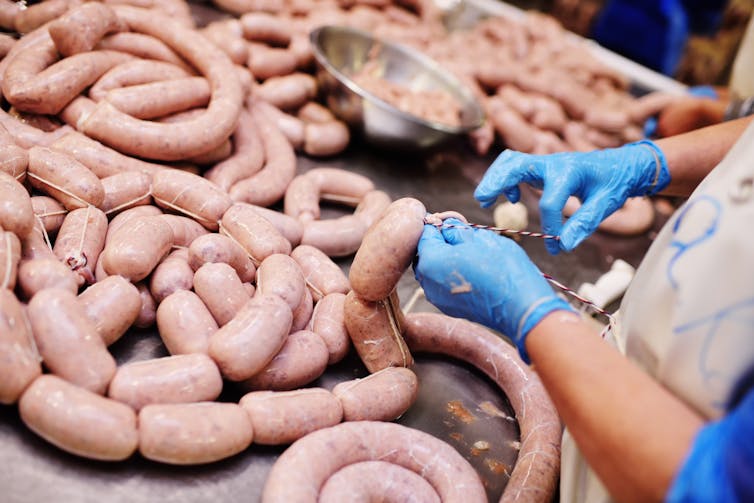This is not just an article from The Conversation, it’s a write up of an actual scientific paper, peer reviewed, recommending public policy. It’s also quite gorgeous in its rampant nonsense. The idea is that we tax meats – so much so that sausages would double in price – then we’ll raise lots of money so that the NHS can pay the costs of treating the diseases caused by meat eating.
There’s only one problem with this. If it is true that meat eating shortens lives then meat eating saves the NHS money. For the longer you live the longer your lifetime health costs. This is definitely true of smoking, boozing and being a fatty lardbucket. It’s going to be the same with any lifespan limiting habit or consumption. Die young and save the NHS money. Thus our mistake here is, well, what damn costs to the NHS of treating diseases caused by meat eating?
Meat tax: why taxing sausages and bacon could save hundreds of thousands of lives every year
By now you’ve probably heard that eating too much red and processed meat is bad for you. Not only is it associated with increased rates of coronary heart disease, stroke, and type 2 diabetes, but there is also convincing evidence that red and processed meat can cause cancer.
The cancer agency of the World Health Organisation (WHO) classifies the consumption of red meat, which includes beef, lamb, and pork, as carcinogenic – or having the potential to cause cancer if eaten in processed form. This includes hot dogs (frankfurters), ham, sausages, corned beef, and beef jerky – as well as canned meat and meat-based preparations and sauces.
The WHO also classifies red meat as probably carcinogenic – even if eaten unprocessed. There is strong mechanistic evidence for an association between eating red meat and colorectal cancer, and there is also evidence of links with pancreatic cancer and prostate cancer.
Given the negative health impacts, there have been calls for certain types of meat to be regulated similar to other carcinogens – such as tobacco or asbestos – or like other foods of public health concern – such as sugary drinks.
Like taxes on other products that can harm health, a health tax on red and processed meat could encourage consumers to make healthier choices. And our new research, which looks at the benefits of a health tax on red and processed meat has found that such as tax could prevent more than 220,000 deaths and save over US$40 billion globally in healthcare costs every year.
A health tax on meat
In our new study, colleagues from the International Food Policy Research Institute in the US, and the Oxford Martin School and the Nuffield Department of Population Health at the University of Oxford in the UK, analysed the impact of regulating red and processed meat consumption through a health tax on meat.

We calculated so-called optimal tax levels that would account for the health costs of red and processed meat in close to 150 countries and regions around the world. So although consumers would still have the choice to eat red and processed meat, they would have to contribute to paying for treating the chronic diseases that its consumption is assumed to cause.
For our study, we used estimates of how red meat and processed meat affect the risks of chronic diseases, and how much it costs to treat those. We then calculated the health and economic burden associated with one additional portion of red and processed meat, and based on that, we estimated the health taxes per portion of red and processed meat that would account for those costs.
High taxes for high consumption
We estimated that in 2020, there will be 2.4m deaths attributable to red and processed meat consumption globally, as well as US$285 billion in costs related to healthcare.
High-income countries, such as the UK and the US consume about double the global average of red and processed meat. These countries also spend more money treating the associated chronic diseases. Low-income countries consume less than half the global average and also spend less money treating meat-related diseases.
Read more: Why we should tax meat that contains antibiotics
Because of this difference in health costs, the health taxes would need to differ by region, to factor in the health and economic burden of red and processed meat consumption in a specific region. And as a result, the health taxes we calculated are based on an economically optimal tax that is high in high-income countries and low in low-income countries.
The health taxes on sausages in Germany, and bacon in the US, for example would increase prices by a whopping 160%. Whereas prices for processed meat in China would have to increase by 40%, and those in Ethiopia by less than 1%. Due to its relatively modest healthcare spending the UK is somewhere in the middle with an 80% increase.
The benefits
The higher prices on red and processed meat encourage dietary shifts to other, less harmful foods. Our results suggest that if the health taxes were introduced, consumption of processed meat would decline by about two portions per week in high-income countries and by 16% globally.
Lower consumption of red and processed meat would lead to 220,000 less deaths a year from chronic disease – such as coronary heart disease, stroke, cancer, and type 2 diabetes. It could also have positive knock-on effects on climate change and body weight.
We found that it could reduce global greenhouse gas emissions by over a hundred million tonnes – mainly due to lower beef consumption. And it would also reduce levels of obesity by driving consumers to lower-calorie substitutions.
Read more: Ten deadly carcinogens (you’ve probably never heard of)
Tax revenues would amount to US$172 billion globally and cover 70% of the health costs that red and processed meat consumption puts on society. To fully cover the costs, the health taxes would have to be doubled and, in high-income countries, increase to 200% for processed meat.
Our findings make it clear that the consumption of red and processed meat has a cost – not just to people’s health and to the planet – but also to healthcare systems and the economy. Governments don’t need to tell people what they can and can’t eat, but they have a responsibility to encourage the adoption of healthy and sustainable diets. And making sure the health costs of foods are reflected in their prices is an important component of that.




Listening to this I was quite literally shouting at the radio. I can bearly afford food At The Moment, and they want to make it EVEN MORE UNAFFORDABLE?????
Why don’t they just plaster billboard with
POOR PEOPLE SHOULD **** OFF AND STARVE!
Ah crap, what happened there?
I still have a copy of the Cranks’ recipe book including their obituary of David Canter, the founder of Cranks who sadly died in middle age while proclaiming the health benefits of a vegetarian diet. That is because I am more tolerant of my friends’ dietary preferences (and a few, albeit very few, of the recipes actually taste nice) and because I, an omnivore with a taste for red meat, am many years older than he was when he died. I would not go so far as to claim that all eaters of red meat will live longer than all… Read more »
They say: “Governments don’t need to tell people what they can and can’t eat, but they have a responsibility to encourage the adoption of healthy and sustainable diets.” Responsibility to encourage? F*** ‘ing F*** off you wankers!
Orwell would recognize their approach.
Or we could remove the universal free at the point of use health care system we have so we didn’t need to cover the cost to the NHS.
Or we could remove the universal free at the point of use health care system we have so we didn’t need to cover the cost to the NHS.
They say: “Governments don’t need to tell people what they can and can’t eat, but they have a responsibility to encourage the adoption of healthy and sustainable diets.” Responsibility to encourage? F*** ‘ing F*** off you wankers!
Orwell would recognize their approach.
As a victim of renal failure I need a high animal protein diet. Do I get meat coupons on the NHS as part of my treatment?